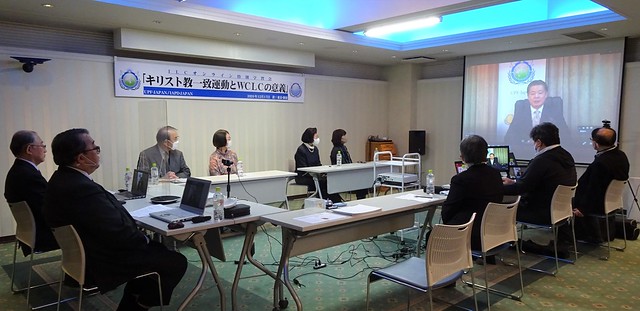Tokyo, Japan—UPF and the Interreligious Association for Peace and Development (IAPD) in Japan convened a webinar on December 17, 2020 to commemorate the first anniversary of the World Christian Leadership Conference (WCLC), an affiliated organization. The event comprised two sessions: the Special Study Session (the WCLC session) and the Special Roundtable Session (the IAPD session).
The first session, the WCLC session, whose theme was "Ecumenical Movement and Interreligious Peace Movement," was attended by around 100 Ambassadors for Peace from across the country.
The event, which was moderated by Mr. Shunsuke Uotani, secretary general of UPF-Japan, began with a welcome address, given by Mr. Masayoshi Kajikuri, chairman of UPF-Japan. Rev. Toru Miyahara, a committee member of the WCLC, gave a lecture on the "Significance of UPF from the Perspective of the Christian World Peace Movement." He spoke about the faith and achievements of Rev. Toyohiko Kagawa, a Japanese Christian leader who was dedicated to the salvation of humankind in the middle of the 20th century. Rev. Miyahara explained that Rev. Kagawa tried to create an international organization for world peace based on Christianity and said that he saw Rev. Kagawa's dream being realized at the inaugural convocation of the WCLC and the World Summit 2020, in which he participated. He added that, inheriting the spirit of Rev. Kagawa, he would contribute to the development of the WCLC for the unity of Christianity and global peace.
Mr. Shinobu Ishimaru, coordinator of the IAPD-Japan, gave a lecture on "The History of the Interreligious Peace Movement and the Significance of WCLC." He gave an overview of the interdenominational and interreligious peace initiatives started by UPF co-founders Rev. Dr. Sun Myung Moon and Dr. Hak Ja Han Moon. He also spoke about the significance of the IAPD and WCLC, which were established on the foundation of these initiatives.
The second session, the IAPD session, aimed at fostering dialogue between religious leaders of Japan and Taiwan and had as its theme "Responsibility of the Religious Leaders for Permanent Peace: From Religious Dialogue to Practical Activities for Peace and Development." Around 160 religious leaders and experts from both countries participated in the session.
The welcome addresses were given by Mr. Masayoshi Kajikuri, chairman of UPF-Japan, and Dr. Yen-Po Tang, president of UPF-Taiwan. Rev. Yoshinobu Miyake, chairman of the International Shinto Studies Association, gave a lecture as the Japanese panelist, and Dr. Yu-Hui Chen, a professor at the National Chengchi University, gave a lecture as the Taiwanese panelist.
Rev. Miyake said religious leaders of Japan and Taiwan would deepen mutual understanding through dialogue. He underscored the importance of them understanding that working together with these values is an Asian tradition and is vital. The responsibility of religious leaders in the 2020s is to put this into practice.
Dr. Chen presented a review of the theory and practice of spiritual leadership, based on the life of Elder Han Yu Lin, who brought the religious tradition of Yiguandao from mainland China to Taiwan. His life story shows how he embodied the basic qualities of a leader, such as integrity, altruistic love and role modeling, qualities that are important for today's religious leaders to cultivate and live by. She also explained the basic tenets of Yiguandao.
Dr. Yoshio Kawakami, chairman of the IAPD-Japan and professor emeritus of Tezukayama Gakuin University, and Dr. Yo Hsiang Chou, professor of Fo-Guang University of Taiwan, commented on the presentations. A lively Q&A session followed.
The exchange between Japanese and Taiwanese religious leaders was successful and furthered a friendly relationship between them.

